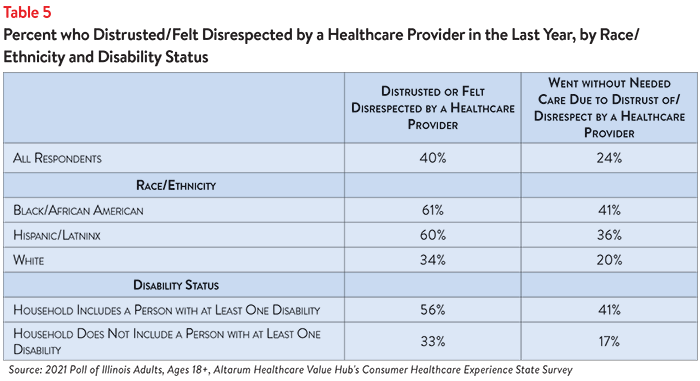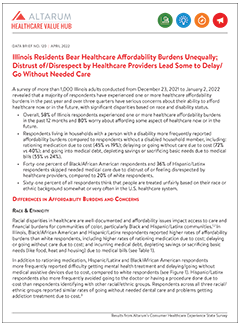Illinois Residents Bear Healthcare Affordability Burdens Unequally; Distrust of/Disrespect by Healthcare Providers Lead Some to Delay/Go Without Needed Care
A survey of more than 1,000 Illinois adults conducted from December 23, 2021 to January 2, 2022 revealed that a majority of respondents have experienced one or more healthcare affordability burdens in the past year and over three quarters have serious concerns about their ability to afford healthcare now or in the future, with significant disparities based on race and disability status.
- Overall, 58% of Illinois respondents experienced one or more healthcare affordability burdens in the past 12 months and 80% worry about affording some aspect of healthcare now or in the future.
- Respondents living in households with a person with a disability more frequently reported affordability burdens compared to respondents without a disabled household member, including: rationing medication due to cost (45% vs 19%); delaying or going without care due to cost (72% vs 40%); and going into medical debt, depleting savings or sacrificing basic needs due to medical bills (55% vs 24%).
- Forty-one percent of Black/African American respondents and 36% of Hispanic/Latinx respondents skipped needed medical care due to distrust of or feeling disrespected by healthcare providers, compared to 20% of white respondents.
- Sixty-one percent of all respondents think that people are treated unfairly based on their race or ethnic background somewhat or very often in the U.S. healthcare system.
Differences in Affordability Burdens and Concerns
Race & Ethnicity
Racial disparities in healthcare are well-documented and affordability issues impact access to care and financial burdens for communities of color, particularly Black and Hispanic/Latinx communities.1,2 In Illinois, Black/African American and Hispanic/Latinx respondents reported higher rates of affordability burdens than white respondents, including higher rates of rationing medication due to cost; delaying or going without care due to cost; and incurring medical debt, depleting savings or sacrificing basic needs (like food, heat and housing) due to medical bills (see Table 1).
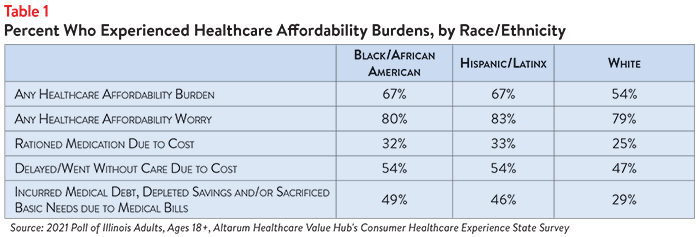
In addition to rationing medication, Hispanic/Latinx and Black/African American respondents more frequently reported difficulty getting mental health treatment and delaying/going without medical assistive devices due to cost, compared to white respondents (see Figure 1). Hispanic/Latinx respondents also more frequently avoided going to the doctor or having a procedure done due to cost than respondents identifying with other racial/ethnic groups. Respondents across all three racial/ethnic groups reported similar rates of going without needed dental care and problems getting addiction treatment due to cost.3
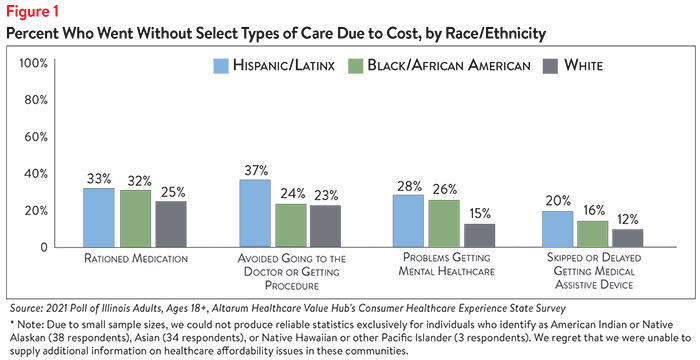
Income
The survey also revealed differences in how Illinois respondents experience healthcare affordability burdens by income. Unsurprisingly, respondents at the lowest end of the income spectrum most frequently reported affordability burdens, with almost 7 in 10 (67%) of those with household incomes of less than $50,000 per year struggling to afford healthcare in the past 12 months (see Table 2). Still, roughly half of respondents living in middle- and high-income households reported struggling to afford some aspect of coverage or care, demonstrating that affordability problems go far up the income ladder. At least 70% of respondents in each income group reported being worried about affording healthcare either now or in the future.
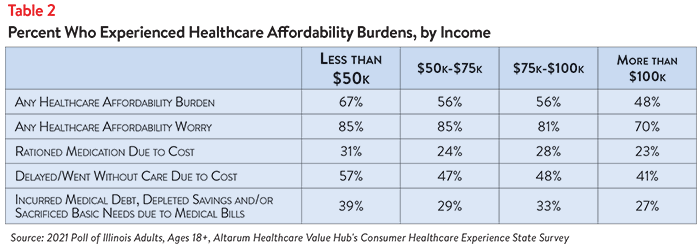
Respondents living in lower-income households also more frequently reported rationing care due to cost. Over half (57%) of lower-income earners reported delaying or going without at least one healthcare service or treatment due to cost in the past year, compared to slightly less than half (41-48%) of middle- and high-income earners. Additionally, nearly 1 in 3 (31%) of respondents with household incomes of $50,000 or less reported not filling a prescription, skipping doses of medicines or cutting pills in half due to cost, compared to roughly 1 in 4 respondents in other income brackets.
Lower-income individuals also most frequently reported financial consequences after receiving healthcare services—thirty-nine percent either went into medical debt, depleted their savings or sacrificed other basic needs (like food, heat or housing) due to medical bills.
Disability Status
People with disabilities interact with the healthcare system more often than those without disabilities and, as a result, tend to face more out-of-pocket costs.4 Additionally, people who receive disability benefits face unique coverage challenges that impact their ability to afford needed care, such as the possibility of losing coverage if their household income or assets increase over a certain amount (for example, after getting married).5
Illinois respondents who have/live with a person with a disability more frequently reported a diverse array of affordability burdens compared to others (see Table 3). These individuals also more frequently reported worrying about healthcare affordability in general (90% vs. 76%) and losing health insurance specifically (44% vs. 27%).
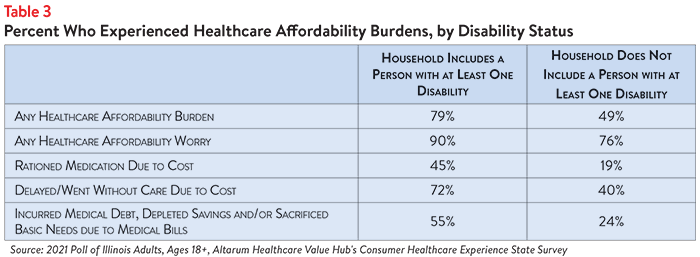
Gender
The survey also surfaced differences in healthcare affordability burdens and worry by gender identity. Respondents identifying as women were more likely to report having experienced at least one affordability burden in the past year than those identifying as men (61% vs. 53%) (see Table 4). While women more frequently reported delaying or going without care due to cost in general, men were slightly more likely to report rationing their medications by not filling a prescription, skipping doses or cutting pills in half.
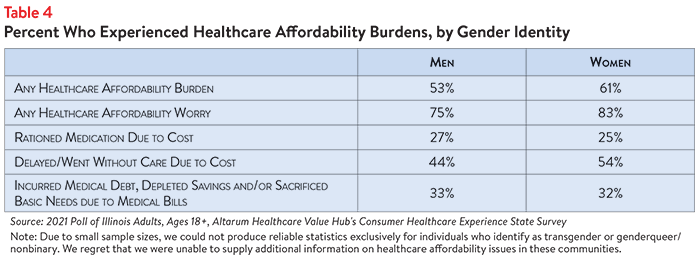
While most respondents of both genders reported being somewhat or very concerned, a higher percentage of women reported worrying about affording some aspect of coverage or care than men (83% vs. 75%).
Due to small sample sizes, this survey could not produce reliable estimates exclusively for transgender or genderqueer/nonbinary respondents. However, it is important to note that these groups experience unique healthcare affordability burdens—1.3% of survey respondents (14 adults) reported that they or a family member had trouble affording the cost of gender-affirming care, such as hormone therapy or reconstructive surgery.
Distrust and Mistreatment in the Health System
Whether a patient trusts and/or feels respected by their healthcare provider can impact whether they seek needed care. In Illinois, nearly 1 in 3 (29%) of respondents reported that their provider never, rarely or only sometimes treats them with respect. When asked why they felt healthcare providers did not treat them with respect, nearly half of respondents cited their income or financial status (47%), followed by race (32%), ethnic background (27%) and physical, mental or cognitive disability (22%). In lesser numbers, respondents cited gender/gender identity (14%), sexual orientation (14%) and experience with violence or abuse (10%) as reasons for the disrespect.
Black/African American respondents, Hispanic/Latinx respondents and those with a person with a disability in their household more frequently reported distrust in and feeling disrespected by their healthcare providers than their white or non-disabled counterparts (see Table 5). They also more frequently went without medical care due to that distrust and/or disrespect. Forty-one percent of Black/African American respondents and 36% of Hispanic/Latinx respondents reported taking this action, compared to 20% of white respondents. Forty-one percent of respondents who have/are living with a person with a disability went without care due to distrust/disrespect, compared to 17% of those without a household member with a disability.
Individual and Systemic Racism
Respondents perceived that both individual and systemic racism exist in the U.S. healthcare system. Sixty-one percent of respondents believe that people are treated unfairly based on their race or ethnic background, either sometimes or very often. When asked what they think causes healthcare systems to treat people unfairly based on their race or ethnic background:
- 1 in 5 (21%) cited policies and practices built into the healthcare system;
- 1 in 4 (24%) cited the actions and beliefs of individual healthcare providers; and
- nearly half (44%) believe it is an equal mixture of both.
Disatisfaction with the Health System and Support for Change
Given this information, it is not surprising that 65% of respondents agree or strongly agree that the U.S. healthcare system needs to change. Understanding how the healthcare system disproportionately harms some groups of people over others is key to creating a fairer and higher value system for all.
Making healthcare affordable for all residents is an area ripe for policymaker intervention, with widespread support for government-led solutions across party lines. For more information on the types of strategies Illinois residents want their policymakers to pursue, see: Illinois Residents Struggle to Afford High Healthcare Costs; Worry About Affording Future Care; Support a Range of Government Solutions Across Party Lines, Healthcare Value Hub, Data Brief No. 117 (April 2022).
Notes
1. Fadeyi-Jones, Tomi et al., High Prescription Drug Prices Perpetuate Systemic Racism. We Can Change It, Patients for Affordable Drugs Now (December 2020).
2. Kaplan, Alan and O’Neill, Daniel, “Hospital Price Discrimination Is Deepening Racial Health Inequity,” New England Journal of Medicine—Catalyst (December 2020).
3. A small share of respondents also reported barriers to care that were unique to their ethnic or cultural backgrounds. Two percent reported not getting needed medical care because they couldn’t find a doctor of the same race, ethnicity or cultural background as them or they couldn’t find a doctor who spoke their language.
4. Miles, Angel L., Challenges and Opportunities in Quality Affordable Health Care Coverage for People with Disabilities, Protect Our Care Illinois (February 2021).
5. A 2019 Commonwealth Fund report noted that people with disabilities risk losing their benefits if they make more than $1,000 per month. According to the Center for American Progress, in most states, people who receive Supplemental Security are automatically eligible for Medicaid. Therefore, if they lose their disability benefits they will also lose their Medicaid coverage. Forbes has also reported on marriage penalties for people with disabilities, including fears about losing health insurance.

